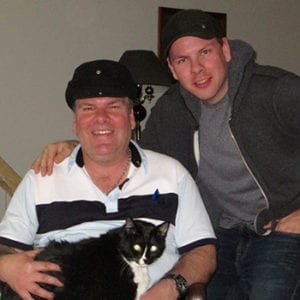At the age of 25, I decided to have my head injured father move in with me for several reasons: to give him a better quality of life, to alleviate pressure on an aging family members and also to learn more about my dad and his injury.
My father had a bad car accident in 1989 when I was two. I grew up visiting him every other weekend through the help of his parents. We took vacations and tried to be there for each other through life’s milestones. At the age of 25, I decided to have my head injured father move in with me for several reasons: to give him a better quality of life, to alleviate pressure on an aging family members and also to learn more about my dad and his injury.
Because I was so young while he was recovering, essentially we both were learning a lot of the same skills at the same time – even though neither of us knew it. The changes I’ve noticed have been in my understanding of the brain injury. It’s one thing to see it every so often, but it’s an entirely different thing to see it on a daily basis. I often struggle dealing with the results of a brain injury – the constant need for reminders – the unintentional selfishness – the blow ups – and the negative attitude – but then I think about how I only witness the external frustrations. The internal battle that must take place on a day to day basis is something that baffles me because even though my first instinct is to talk about how difficult it is as a caregiver, there are moments of clarity, respect and admiration. He defied the odds of being told he would never be able to walk or work again years ago – but I’ve noticed things in this past year that truly show that even today, 25 years after the accident, he is still progressing. This may sound strange, but this past March I was under pressure trying to reach a deadline that saw me working day and night. When things are somewhat ‘normal’ I often try to take care of the meals and guide Dad to accomplish certain household tasks, but there was no time for that – I was too busy. I came home from work to start working on a side project with a friend of mine and my Dad had dinner waiting for all three of us. In my 26 years, he’s never done that without being prompted or coached. It was a small gesture that meant a lot because he recognized how busy I was and took the initiative to help out – to me that was a milestone.
One of the things that really helped me and might help others is humour & patience – this seems to be the winning combination. I know at times I don’t want to joke nor do I want to wait – but when I take the time to be patient with him and try to make fun of whatever task is at hand – we’re both better off. Acknowledging his frustration is important because it’s a MAJOR concern in his mind. It’s front and centre – it’s stopping him, it’s angering him – it’s a road block. If I dismiss it and just shut down his opinion that not only adds to the problem but it also creates a new one in our relationship. I can easily sit here and type this, but in the moment it can be very difficult for me to remember the steps to helping him move forward – especially when I’m in a rush. Patience is key – but so is a good sense of humour.
People to know lot of support is needed for the ABI survivor so he or she can continue to reach personal goals – but also, a lot of support is needed for caregivers and family dealing with a survivor – because it’s not easy. Support teams are essential and asking for help is encouraged. It’s been a life-long journey trying to understand how to work with, live with and support someone who is head injured, but personally, I’m glad I’m doing it. Brain injuries aren’t the only challenge people face – there are so many different diseases, disorders and conditions – and I believe that we can learn something from all of them – I believe in breaking down the stigma attached to these things. Someone once told me “If you exclude people with disabilities, you are excluding a greatness that you could benefit from”. We can all learn something form each other – yes – Dad may not be able to teach me how to run a business – but he can teach me to appreciate life and to never stop trying to achieve whatever goal you set out for yourself – big or small.





